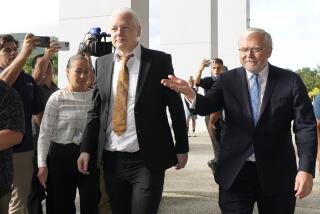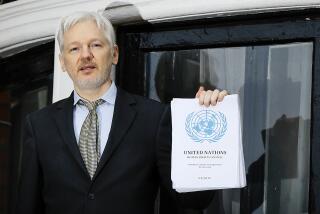Edward Snowden desperately seeking asylum: <i>Habla español</i>, Edward?
I used to be intrigued by Edward Snowden, the NSA leaker who did the country a favor by revealing proof of the government’s intrusive domestic spying program.
Now, I am starting to feel a little sorry for the guy, a fugitive who has become a kind of worldwide reject, as his quest for political asylum has begun to look like the geopolitical equivalent of “Let’s Make a Deal.” He’s asked 21 countries so far to accept him. So far, no one has said “Come on down!”
In a statement posted on the WikiLeaks site this week, Snowden angrily denounced the U.S. for annulling his passport. “The Obama administration has now adopted the strategy of using citizenship as a weapon,” he wrote. “Although I am convicted of nothing, it has unilaterally revoked my passport, leaving me a stateless person. Without any judicial order, the administration now seeks to stop me exercising a basic right. A right that belongs to everybody. The right to seek asylum.”
That accusation seems specious to me, actually. An invalid passport is not a revocation of citizenship, nor has it stopped him from seeking asylum. He is more than welcome to return to his motherland, and the U.S. has offered safe passage all the way home.
But Snowden has suggested that he will not return to the U.S. unless the Justice Department agrees to let him to remain free before trial, citing the disturbing treatment of Bradley Manning, the soldier who was kept in solitary confinement for months awaiting his trial, which began last month, for disseminating classified information to WikiLeaks. A U.N. investigation found the conditions under which Manning was kept “cruel, inhuman and degrading.”
A little over a week ago, in a fascinating conference call with reporters on June 24, Snowden’s spirit guide Julian Assange, the prickly WikiLeaks founder who is holed up in the Ecuadorean embassy in London, refused to divulge Snowden’s location. “He is in a safe place and his spirits are high,” Assange said.
But that was then.
One week later, Russian President Vladimir Putin made it clear that Snowden would be welcome in Russia only if he “stopped his work aimed at bringing harm” to the United States. A day later, the Kremlin announced that Snowden had withdrawn his asylum request.
On the same day, The Times reported that Snowden, who is presumed to be staying in a transit zone in Moscow’s Sheremetyevo Airport, had met with Russian diplomatic officials and handed them appeals for asylum in 15 countries. A Russian Foreign Ministry official told my colleague Sergei Loiko that it was “a desperate measure.”
The WikiLeaks website has reported that Snowden, in fact, has asked more than 20 countries to consider giving him political asylum.
Ecuador may have rolled up the welcome mat, but the presidents of Venezuela and Bolivia, who were in Russia this week meeting with leaders of other gas-exporting countries, seemed to offer Snowden some hope.
Venezuela’s Nicolas Maduro told Russian news agencies that Snowden deserved protection, and Bolivia’s Evo Morales said his country would consider granting asylum.
“The world cannot be governed by the imperialist elite of the United States,” Maduro told reporters.
But Snowden, in his first long interviews with Glenn Greenwald, one of the reporters who broke the original story for The Guardian, said he felt certain that if the U.S. wanted to bring him home, the country would find a way to do so.
This week in Senegal, President Obama, who has done a magnificent job talking from both sides of his mouth on this issue – declaring his support of a frank public discussion on the issues raised by Snowden’s disclosures while doing his best to keep the massive and potentially unconstitutional privacy invasions secret – pooh-poohed that idea.
“I’m not going to be scrambling jets to get a 29-year-old hacker,” he told reporters. He also said he would not “start doing wheeling and dealing and trading on a whole host of other issues simply to get a guy extradited.”
But, he said, “My continued expectation is that Russia or other countries that have talked about potentially providing Mr. Snowden asylum recognize that they are part of an international community, and that they should be abiding by international law. And we’ll continue to press them as hard as we can to make sure that they do so.”
I’m just guessing here, but I think Snowden should start brushing up on his Spanish.
ALSO:
Man dies after being dragged 75 feet in Compton hit and run
Hawthorne police receive threats after deadly Rottweiler shooting
Fourth of July weather: Some clouds, slightly below-normal temps
Twitter: @robinabcarian
More to Read
Sign up for Essential California
The most important California stories and recommendations in your inbox every morning.
You may occasionally receive promotional content from the Los Angeles Times.











